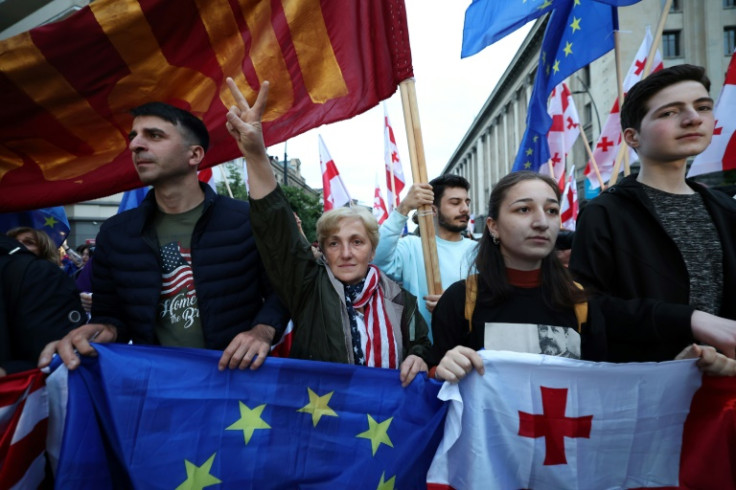Georgia Gears Up To Overturn Veto On Russia-style 'Foreign Influence' Law

Georgian lawmakers geared up on Tuesday to overturn a presidential veto and push through a controversial "foreign influence" bill that opponents say will place onerous restrictions on foreign-funded NGOs and derail the country's path to the European Union.
The draft law, which has sparked weeks of mass protests, would label NGOs and media outlets receiving at least a fifth of funding from abroad as "organisations pursuing the interests of a foreign power".
The proposal has drawn a fierce backlash from Western governments including the United States, and has been compared to similar legislation used to silence dissent in Russia.
Parliament said that during Tuesday's plenary session it would vote on whether to overturn pro-EU President Salome Zurabishvili's veto of the law, allowing it to come into force.
Parliament speaker Shalva Papuashvili vowed that MPs from the ruling Georgian Dream party, which holds a commanding majority in the chamber, would "definitely overcome the veto".
The ruling party has said the proposal is aimed at ensuring "transparency", arguing that foreign-funded groups undermine Georgia's sovereignty.
But rights groups and Western governments warn it would further ignite tensions in the deeply polarised Caucasus country.
Non-governmental organisations, including anti-corruption group Transparency International, have told AFP their assets may be frozen and their work limited if the law is pushed through.
Protesters began gathering near parliament on Tuesday morning, with many carrying Georgian and European flags.
A fresh rally is planned for the evening, with Tbilisi already gripped by protests since Georgian Dream resurfaced the law in early April.
Tensions are also expected to be high in the parliament chamber, which has seen scuffles and fights break out between government and opposition lawmakers on at least two occasions.
The EU's top diplomat Josep Borrell on Monday warned that the law showed Georgia's government was "derailing from the European track" and that the bloc's foreign ministers would assess what to do next.
President Zurabishvili, a fierce critic of the ruling party, has called on the opposition to form a united front ahead of parliamentary elections in October.
The ruling party introduced the bill last month, reviving a previous bill that was dropped in March 2023 after weeks of angry protests.
It was adopted by parliament two weeks ago but vetoed by Zurabishvili days later on May 18.
The United States announced last week it had placed visa restrictions on officials responsible for reviving the law and was reviewing its relations with Tbilisi.
Activists, independent journalists and opposition politicians have faced weeks of violence and threats since the government announced the draft legislation, in what rights groups have called a targeted campaign.
Opposition politicians have accused the government of seeking to appease the Kremlin, an accusation it denies.
© Copyright AFP 2025. All rights reserved.





















